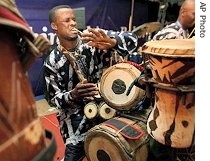2007年VOA标准英语-Term 'World Music' Celebrates 20 Years(在线收听)
London
29 May 2007
The term "world music" is being used to loosely describe non-Western music that was previously described as "folk music" or "ethnic music". Reporting for VOA from London, Tendai Maphosa reports world music also includes modern, cutting edge pop music styles from various regions of the world.
Twenty years ago a group of British record company executives got together in London and coined the term "world music" to describe music other than mainstream western pop. They were frustrated by the fact that a growing number of people interested in music "from out there," as some describe it, could not find it because record stores did not know how to file and categorize it.
The editor of fRoots magazine, Ian Anderson, told VOA that World Music was, and still is, no more than a bin in a record shop.
"All it ever was was a way of creating opportunities [that] could be heard by people," he said. "Nobody ever suggested there was a thing called "World Music." In fact at the first meeting we tried to find the term that included the most things and excluded the least, so Tropical because that missed out ... Ethnic was boring or World Beat because that left out stuff that did not have drums."
Anderson added none of those responsible for creating the term ever imagined world music would become such accepted currency in most parts of the West. He said artists who otherwise were not given any respect in their own countries are now looked at differently after touring or doing the World Music Festival circuit. And having a World Music section in most record stores has resulted in higher sales.
 |
| An unidentified Nigerian man plays African drums at a show to mark 2006 World Music Day in Lagos, Nigeria |
For example, Canadian-based Somali rapper K'Naan was honored as newcomer of the year. K'Naan was born in Mogadishu and escaped from Somalia to Canada with his family.
The winner of the Asia-Pacific category was India's slide-guitar maestro Debashish Bhattacharya. He said world music has given him a platform to promote his art.
"I have [a] different variety of inspiration in my life, but this is a special inspiration when I am working to bring Indian raga music into the world genre since ... the last 15 years," he said.
But not everyone agrees with the use of the term. Some musicians say music is music, and their records should be filed along with western music not separated.
Former Talking Heads front man David Byrne launched one of the most scathing attacks on the term in a 1999 article headlined "I Hate World Music." He accused its creators of "ghettoizing" the music.
Anderson dismisses the musicians who resent the use of the term, saying it has not harmed the careers of good musicians. As for Byrne, his record label Luaka Bop now uses the term on its Web site, so he may have changed his mind.
 |
| French singer Agnes Jaoui (2ndR) performs after being awarded Best World Music Album of the Year during 22nd "Victoires de la Musique" (French Music Awards) ceremony in Paris, 10 March 2007 |
Yusuf Mahmoud, who promotes a festival of traditional Zanzibari music, and Hildegard Kiel, who runs a music school on the island, are trying to revive interest in Zanzibari traditional music, which was falling out of favor as people preferred western music.
"The term 'world music' seems to be something, which is kind of understood perhaps in different ways by the foreign visitors to the island, particularly from Europe and also maybe North America, but for Tanzanian people I can honestly say the term 'world music' means nothing," Mahmoud said.
Mahmoud and Kiel were also among those given awards by the BBC's Radio 3, as was the late Malian king of the desert blues, Ali Farka Toure, who won two Grammies before he died of cancer in 2006.